Iranian Supreme Leader Ali Khamenei rebuffed President Trump’s request to leave the country and warned that any US strikes on Iran would have “irreparable consequences.”
Supreme Leader Khamenei says Iran will ‘never surrender’
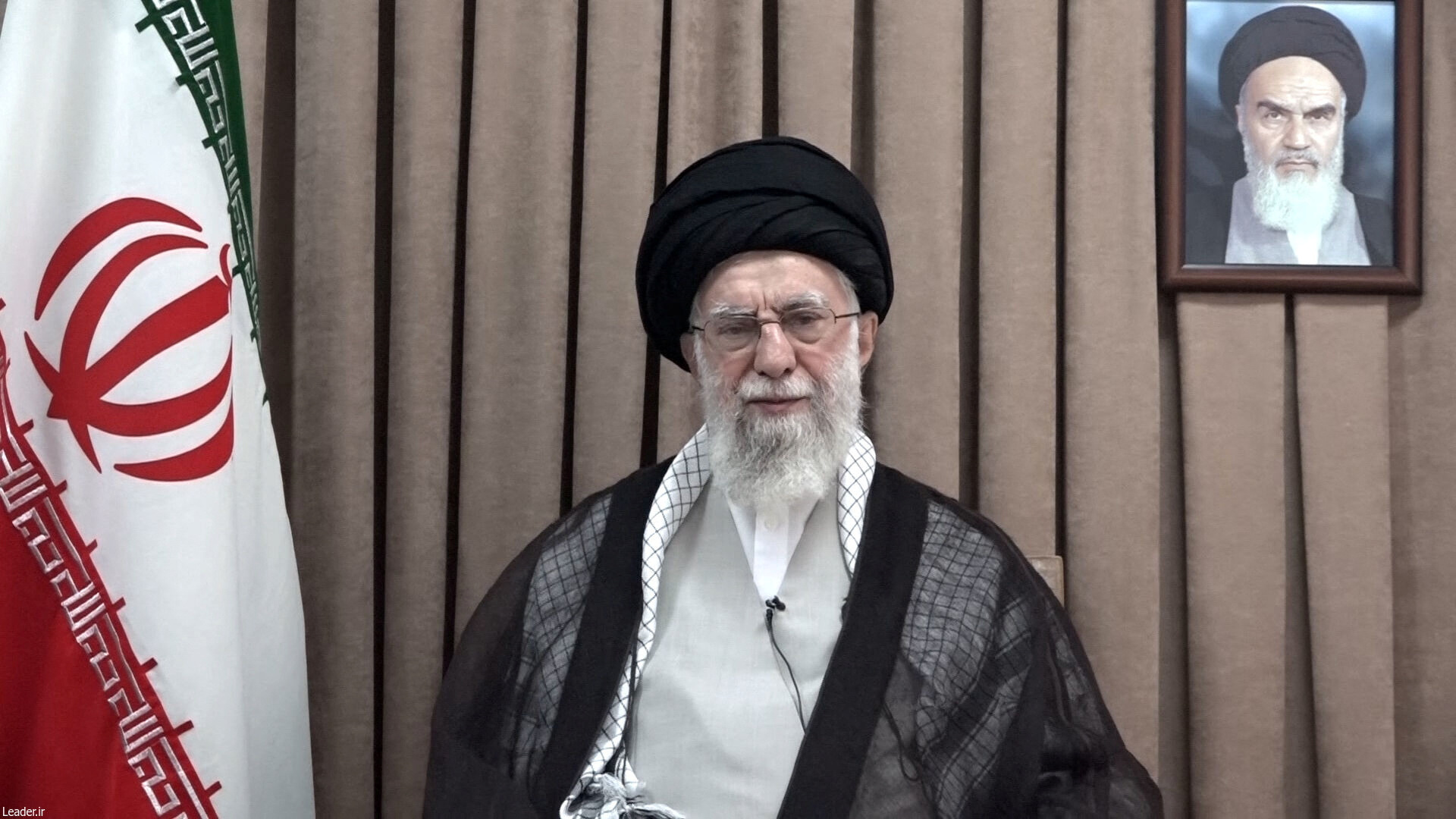

Iranian Supreme Leader Ali Khamenei rebuffed President Trump’s request to leave the country and warned that any US strikes on Iran would have “irreparable consequences.”
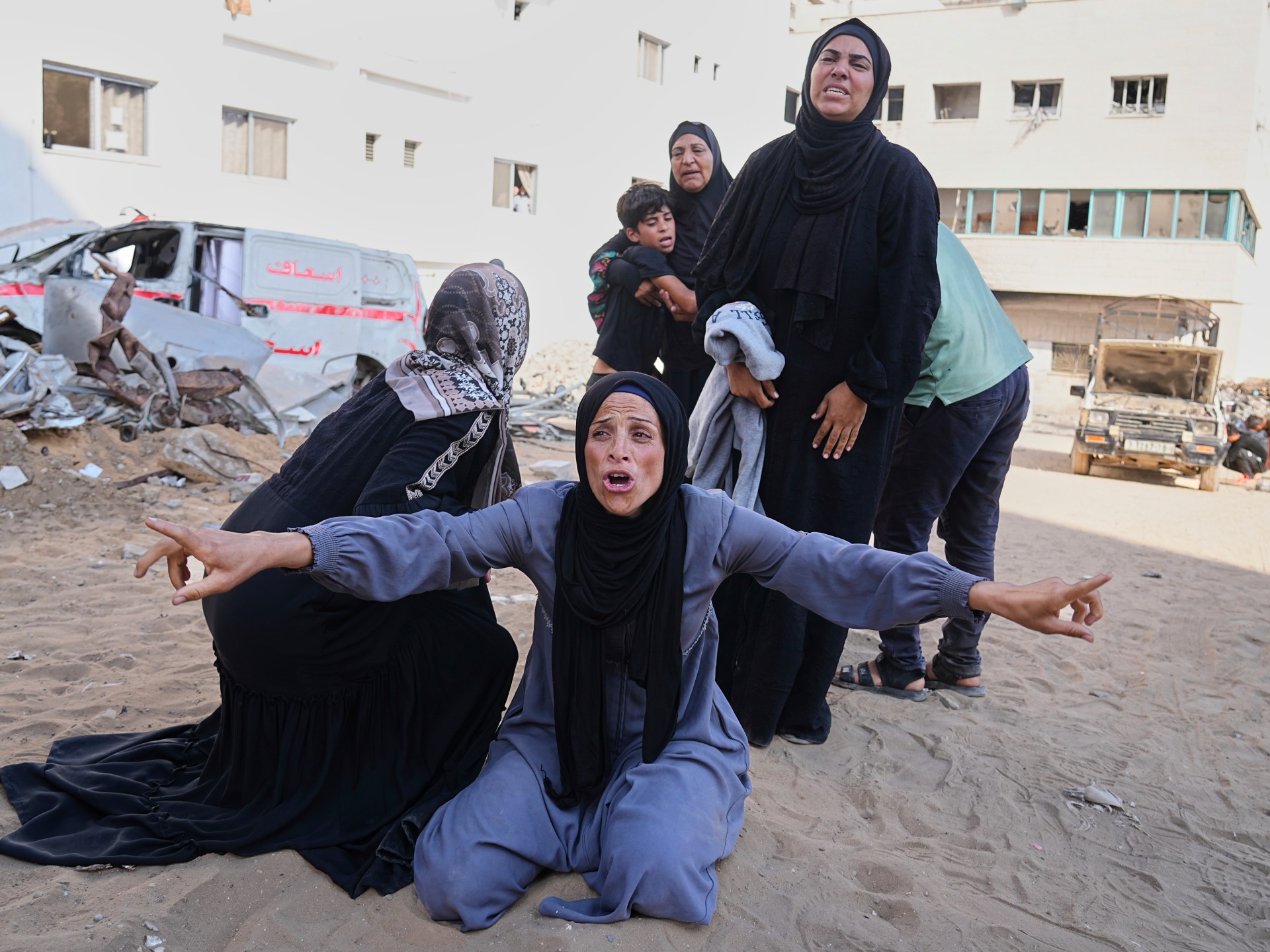
According to Palestinian health officials, at least 72 Palestinians have been killed by Israeli fire in Gaza since dawn, including 29 people who had been waiting for aid trucks. This is the most recent carnage affecting people who are frantically awaiting food for their afflicted families.
Medical sources told Al Jazeera that the most recent daily killing of Palestinian aid workers in recent weeks occurred on Salah al-Din Street near the Netzarim Corridor in central Gaza on Wednesday morning. According to them, the attack left over 100 people injured.
In another deadly Israeli attack on a home south of Gaza, an airstrike struck the Zeitoun neighborhood, killing eight people and injuring others, according to medical sources.
In Israel’s attacks on tents of displaced people in the south of Gaza, eight more people were killed, according to medical sources, and others were injured, according to medical sources. A woman and two children were among the victims, according to the Palestinian news agency Wafa.
According to reports from news agencies, medical personnel were also injured at the Maghazi camp in central Gaza. A husband, wife, and children from a single family were among the ten people killed in the strike, according to Wafa.
Hamas criticized Israel’s assault on residential areas in the enclave as well as its targeting of aid seekers at distribution centers run by the contentious US- and Israeli-backed Gaza Humanitarian Foundation (GHF).
The group claimed that “war crimes” are perpetrated by the occupation, the systematic abuse of innocent civilians, the escalation of massacres, the targeting of the starving, forced evictions, and the shrinking of areas that the occupation claims are “safe.” Israel’s attacks are “a part of the brutal extermination that has been going on for almost 20 months,” it continued.
When asked for comment, the Israeli military disclosed to Reuters that it was investigating reports of people dying while waiting for food.
The bodies of 20 people who had been shot dead by Israeli forces in northern Gaza were left on the street for five days before the UN Office for the Coordination of Humanitarian Affairs received approval to coordinate their recovery, according to Al Jazeera reporters on the ground later on Wednesday.
After Israel partially lifted a nearly three-month total blockade on food, medicines, and other essential items, the GHF began distributing a small amount of food aid in Gaza at the end of May, which sparked fears of famine for the 2.3 million people who live there. Israel has in effect kept the punishing blockade in place by allowing no other aid to enter.
In the midst of the chaos, desperate Palestinians are given a tight window of opportunity to search for food, making Israeli mass killings of aid seekers a somber occurrence.
The GHF has been criticized by the UN and other major humanitarian organizations for its refusal to cooperate, citing concerns that it prioritizes Israeli military needs over humanitarian needs and avoids organizations with decades of experience in providing food and medicine to Gaza’s entire population.
Ahmed Ghaben described the relative’s death to Al Jazeera as “a martyr,” as his nephew was reported to have traveled to bring his children a bag of flour. He left 14 members of his family. He was hungry, so he went to get aid. He fought against the opposition. He went to the flour bag.
According to Tareq Abu Azzoum, who spoke from Deir el-Balah, it is abundantly clear that Israeli forces are attacking civilians who have only ever gone to get bags of flour or food. According to witnesses, the soldiers used a variety of weapons, including tanks and drones. The civilians have also been shot down by snipers who have been stationed in nearby hills.
The Israeli military asserts that these enraged citizens pose a security threat, but these assertions have not been proven by credible evidence.
In Gaza’s most bloody day of violence so far, Israeli troops killed at least 70 Palestinians and injured hundreds as they sought help on Tuesday.
Since late May’s distribution resumed, the Gaza-based Ministry of Health reported on Tuesday that 397 Palestinian aid seekers had died and more than 3, 000 had been injured.
Since the conflict broke out in October 2023, Gaza’s health ministry has reported an increase in the number of fatalities to 55, 637, and the number of injured has increased to 129, 880.
The ministry also issued a warning about severe fuel shortages, stating that only three days’ worth of fuel were available at the territory’s few fully functional hospitals.
The ministry claimed that Israeli forces were preventing international aid organizations and UN organizations from gaining access to hospital fuel storage facilities under the pretext that they were in “red zones” and threatened to shut down hospitals that rely on generators for power.
A top Houthis leader in Yemen, one of Iran’s key allies, said they will continue to support Palestinians in the Gaza Strip until Israeli “aggression stops, and the siege is lifted, while much of the world’s attention is now focused on the Israeli-Iran conflict and what the United States may or may not do.
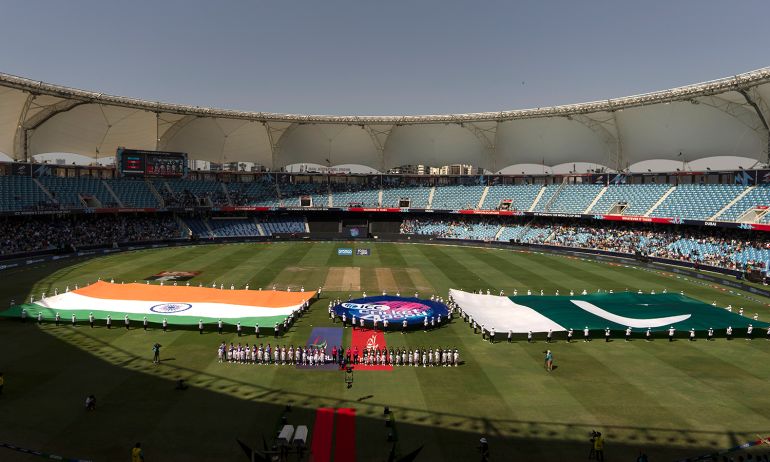
Five months after the two nations’ most intense military escalations, cricket’s governing body has confirmed that India and Pakistan will compete in the Round-Robins of the International Cricket Council’s (ICC) Women’s Cricket World Cup 2025.
According to the tournament’s schedule, which the ICC announced on Wednesday, the two cricket powerhouses will also face off in the group stage of the ICC Women’s T20 World Cup 2026. The marquee event will take place on June 14.
Due to the two countries agreeing an ICC-brokered deal in December 2024 to face each other at neutral venues at upcoming ICC events, India will host the 50-over World Cup 2025 from September 30 through November 2. However, all of Pakistan’s games, including any appearances in the semifinals and final, will take place in Sri Lanka.
Before a ceasefire was reached on May 10, India and Pakistan were engaged in their worst standoff since 1999, which lasted for four days. There are conflicting accounts about the casualties, but more than 70 have been killed by missile, drone, and artillery fire on both sides.
Numerous Indian media outlets reported that the ICC has requested that the ICC avoid assigning them the same group as Pakistan in international competitions in response to the escalations.
However, BCCI vice president Rajeev Shukla stated that due to the ICC’s engagement, India will meet its western neighbor at ICC events even though it does not “want to play with Pakistan in bilateral series because of the government’s stand.”
According to Shukla, who was quoted by Indian media as saying, “The ICC is also aware, whatever is happening, they will look into it.”
Former and current cricketers from both nations posted messages on social media supporting their respective armed forces during the standoff, which heightened fears of an all-out war.
The ICC confirmed the schedule for the 50-over tournament on Monday, with the India-Pakistan round-robin stage match scheduled for Colombo, Sri Lanka, during the first week of the tournament, despite the severity of the situation.
The R Premadasa Stadium is most likely the location of Pakistan’s six matches, which will also take place in the capital of Sri Lanka.
The first knockout match will take place on October 29 in Colombo if Pakistan is selected to advance to the semifinals. The match will take place in Guwahati on the same day if they do not advance.
Similar decisions will be made regarding the final, with Bengaluru hosting the event if it is not hosted by Pakistan but Colombo getting the hosting rights if not.
The eight-team Women’s Cricket World Cup will begin on September 30 when hosts India take on Sri Lanka at Bengaluru’s M Chinnaswamy Stadium.
The other participating countries include Sri Lanka, Australia, England, Bangladesh, Bangladesh, New Zealand, South Africa, and Bangladesh.
In June of next year, India and Pakistan will play in the United Kingdom in their Group 1 match of the ICC Women’s T20 World Cup.
At 13:30 GMT, the game will take place at Birmingham’s Edgbaston Cricket Ground.
The tournament will take place in seven locations throughout England and Wales, one of which was New Zealand’s last victory in 2024.
In the first match of the tournament, England hosts Sri Lanka at Edgbaston on June 12 at 17:30 GMT.
There will be twelve teams, split into two groups.
At the conclusion of the qualifying rounds in 2026, Group 1 will consist of Australia, India, Pakistan, South Africa, and two qualifiers.
England, New Zealand, West Indies, Sri Lanka, and two qualifiers make up Group 2.
The Oval Cricket Ground in London will host the semifinals on June 30 and July 2, while Lord’s Cricket Ground will host the final on July 5.
The last time India and Pakistan met was on October 6 at the ICC Women’s T20 World Cup 2024 in Dubai, where they clinched a six-wicket victory.
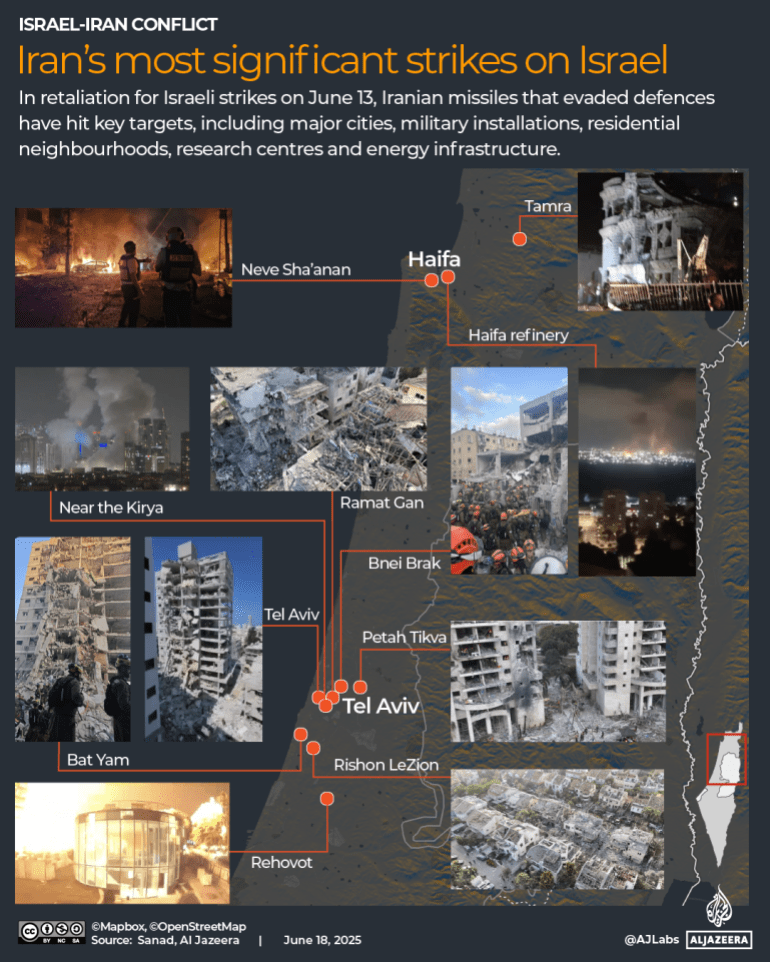
EXPLAINER
A fire that appeared to have engulfed several cars in central Israel on Wednesday morning came from an Iranian missile. According to the Iranian Fars News Agency, the Meron Airbase in northern Israel was one of the targets.
Since Friday, at least 240 people have been killed by Israeli attacks in Iran, compared to at least 24 Israeli attacks in Israel.
According to Israeli media reports on some strikes carried out across the nation with various levels of casualties and damage. However, reports of attacks involving sensitive or strategic targets are frequently kept secret or restricted from the public because of military censorship in place during wartime.
Al Jazeera’s fact-checking unit, Sanad, has mapped some of the most significant Iranian attacks on Israel from Saturday through Monday using publicly available information, including publicly available images and videos from Israeli media outlets, as well as visual identification of destroyed locations in Israeli cities.
The map below shows these locations:
missiles flew just 300 meters (984 feet) from Tel Aviv’s headquarters of the Israeli Ministry of Defense, the Kirya.
One of Israel’s most sensitive and heavily fortified government complexes, where important military and intelligence offices are located, is often referred to as “Israel’s Pentagon.”
The Rehovot, one of Israel’s top research facilities, was also hit by a second strike, which occurred in the south of Tel Aviv of Rehovot. According to reports, the institute collaborated with the Israeli military, making it a significant target.
Several areas across the Tel Aviv’s largest metropolitan area have also come under fire.
In Ramat Gan, a city close to Tel Aviv, missiles struck a number of towers and residential complexes, causing significant damage and requiring evacuations. Nine buildings were reported to have been destroyed by local authorities.
![A drone photo shows the damage over residential homes at the impact site following missile attack from Iran on Israel, in Ramat Gan, Israel June 14, 2025. [Yair Palti/Reuters]](https://i0.wp.com/www.aljazeera.com/wp-content/uploads/2025/06/2025-06-14T171742Z_393935642_RC2H2FAKRINZ_RTRMADP_3_IRAN-NUCLEAR-RAMAT-GAN-IMPACT-1749930086.jpg?w=696&ssl=1)
A religious school was destroyed in Bnei Brak, while the nearby city of Petah Tikva, in the east, was also hit by missile strikes that severely damaged both residential and commercial areas.

According to emergency services, Bat Yam, south of Tel Aviv, experienced the highest levels of destruction and casualties in Israel, with nine confirmed fatalities and about 200 injured. Multiple homes were destroyed in Rishon LeZion, adding to the region’s extensive damage.

Iranian missiles struck Haifa’s Bazan petrochemical complex, the nation’s largest oil refinery, in northern Israel, causing the country’s largest oil refinery to shut down operations.
A second missile strike struck several residential units in the Neve Sha’anan neighborhood in Haifa.

Four women from the same family were killed in Tamra, a town of 35, 000 people primarily from Palestine in northern Israel, by an Iranian missile. Tamra lacks adequate bomb shelters, just like many other Israeli towns.

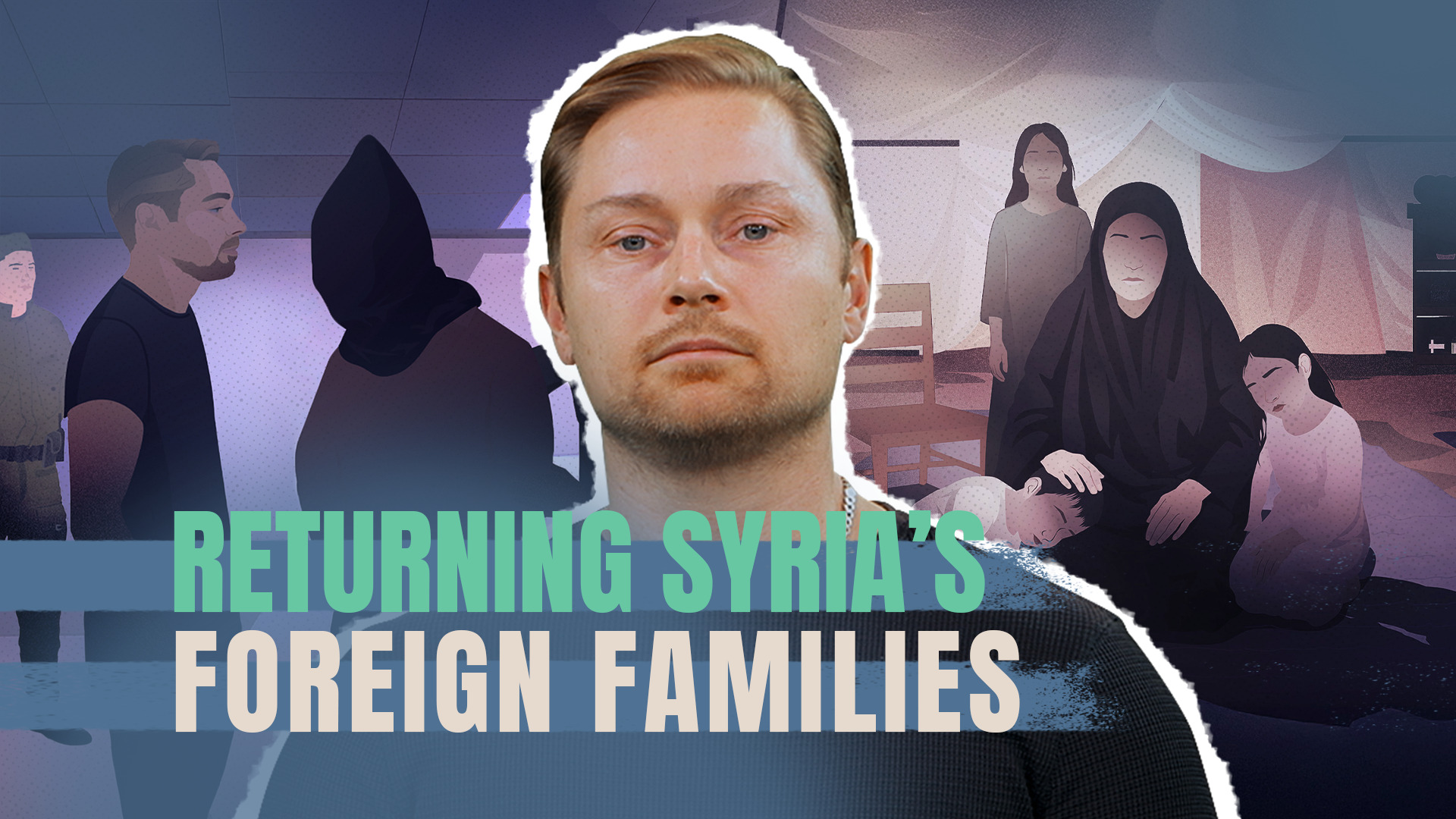
In northeastern Syria, thousands of families linked to ISIL are awaiting repatriation and are stranded in detention camps.
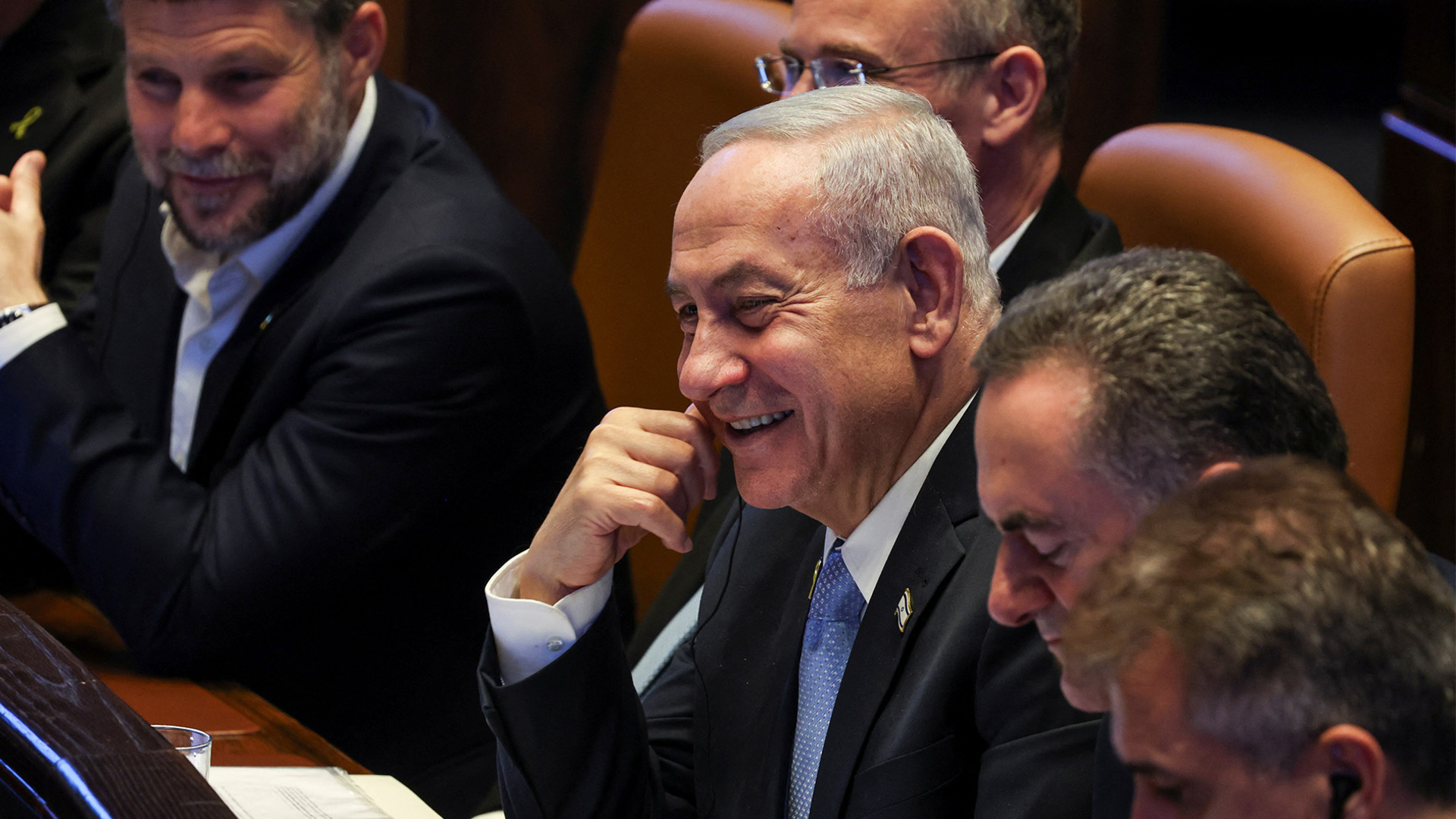
The person who cried “bomb.” Israeli Prime Minister Benjamin Netanyahu has been telling the world that Iran is about to develop nuclear weapons for more than 30 years. Isreal used this ageing pretext to justify its ongoing attacks on Iran, but the UN disagreed.